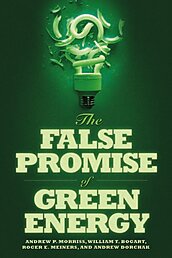Green energy promises an alluring future—more jobs in a cleaner environment. We will enjoy a new economy driven by clean electricity, less pollution, and, of course, the gratitude of generations to come. There’s just one problem: the lack of credible evidence that any of that can occur.
The False Promise of Green Energy critically and realistically evaluates the claims of green-energy and green-jobs proponents who argue that we can improve the economy and the environment, almost risk-free, by spending hundreds of billions of taxpayer dollars in return for false or highly speculative promises. The book examines the claims green-energy proponents make, including assertions of how green energy will revitalize the job market, produce new forms of clean transportation, and improve environmental health and safety, energy efficiency, and more. The authors explore the underlying politics and gamesmanship lurking below the surface.
Proponents of green energy are a large, vocal alliance of special interests–corporations, politicians and environmentalists–who have found common cause in demanding huge taxpayer subsidies for an assortment of programs under the rubric “green jobs.” As detailed in this compelling book, the ultimate agenda–and its impact if implemented–is far larger and more insidious than acknowledged. Green-energy mobilization calls for restructuring the world’s economy and social organization on the basis of myths about forecasting, technologies, and economics.
The False Promise of Green Energy illustrates the irresponsibility of attempting to transform modern society with borrowed money, wishful thinking, and bad economics. It shows how the top-down control programs offered by green-energy and green-jobs advocates are unlikely to achieve positive results compared with allowing competitive forces to continue to provide ever greater environmental quality and energy efficiencies.
